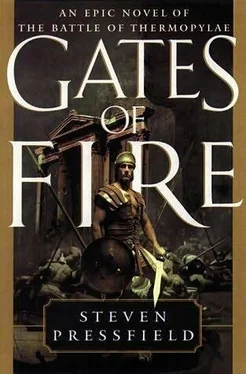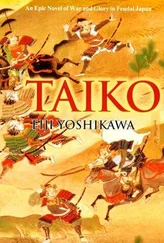Steven Pressfield - Gates of Fire - An Epic Novel of the Battle of Thermopylae
Здесь есть возможность читать онлайн «Steven Pressfield - Gates of Fire - An Epic Novel of the Battle of Thermopylae» весь текст электронной книги совершенно бесплатно (целиком полную версию без сокращений). В некоторых случаях можно слушать аудио, скачать через торрент в формате fb2 и присутствует краткое содержание. Жанр: Историческая проза, на английском языке. Описание произведения, (предисловие) а так же отзывы посетителей доступны на портале библиотеки ЛибКат.
- Название:Gates of Fire: An Epic Novel of the Battle of Thermopylae
- Автор:
- Жанр:
- Год:неизвестен
- ISBN:нет данных
- Рейтинг книги:3 / 5. Голосов: 1
-
Избранное:Добавить в избранное
- Отзывы:
-
Ваша оценка:
- 60
- 1
- 2
- 3
- 4
- 5
Gates of Fire: An Epic Novel of the Battle of Thermopylae: краткое содержание, описание и аннотация
Предлагаем к чтению аннотацию, описание, краткое содержание или предисловие (зависит от того, что написал сам автор книги «Gates of Fire: An Epic Novel of the Battle of Thermopylae»). Если вы не нашли необходимую информацию о книге — напишите в комментариях, мы постараемся отыскать её.
Gates of Fire: An Epic Novel of the Battle of Thermopylae — читать онлайн бесплатно полную книгу (весь текст) целиком
Ниже представлен текст книги, разбитый по страницам. Система сохранения места последней прочитанной страницы, позволяет с удобством читать онлайн бесплатно книгу «Gates of Fire: An Epic Novel of the Battle of Thermopylae», без необходимости каждый раз заново искать на чём Вы остановились. Поставьте закладку, и сможете в любой момент перейти на страницу, на которой закончили чтение.
Интервал:
Закладка:
Many, like Polynikes in the van among the Knights, were sprinters of Olympic and near-Olympic stature with garland after garland won in games before the gods.
These now, loosed by Leonidas and driven on by their own lust for glory, pressed home the sentence of steel upon the fleeing Syrakusans.
When the trumpeters had blown the salpinx and its mind-numbing wail sounded the call to still the slaughter, even the rawest untrained eye could read the field like a book.
There, on the Spartan right where the Herakles regiment had routed the Antirhionians, one saw the turf unchurned and the field beyond littered with enemy shields and helmets, spears and even breastplates, flung aside by the stampeding foe in his flight.
Bodies lay scattered at intervals, facedown, with the shameful gashes of death delivered upon their fleeing backs.
On the right where the stronger troops of the enemy had held longer against the Skiritai, the carnage spread thicker and more dense, the turf chewed more fiercely; along the battle wall which the foe had erected to anchor its flank, clumps of corpses could be seen, slain as they, trapped by their own wall, had struggled in vain to scale it.
Then the eye found the center, where the slaughter had achieved its most savage concentration.
Here the earth was rent and torn as if a thousand span of oxen had assaulted it all day with the might of their hooves and the steel of their ploughs' deep-churning blades. The chewed-up dirt, dark with piss and blood, extended in a line three hundred meters across and a hundred deep where the feet of the contending formations had heaved and strained for purchase upon the earth.
Bodies sprawled like a carpet upon the earth, mounded in places two and three deep. To the rear, across the plain where the Syrakusans had fled, and along the riven walls of the watercourse, more corpses could be seen in scattered perimeters manned by two and three, five and seven, where these in their flight had closed ranks and made their stand, doomed as castles of sand against the tide. They fell with wounds of honor, facing their Spartan foe, cut down from the front.
A wail arose from the hillsides where the watching An-tirhionian skirmishers now looked down upon their comrades' vanquishment, while from the walls of the citadel itself wives and daughters keened in grief as must have Hekube and Andromache upon the battlements of Ilium.
The Spartans were hauling bodies off the stacks of the dead, seeking friend or brother, wounded and clinging yet to life. As each groaning foeman was flung down, a xiphos blade held him captive at the throat. Hold! Leonidas cried, motioning urgently to the trumpeters to resound the call to break off. Attend them! Attend the enemy too! he shouted, and the officers relayed the order up and down the line.
Alexandras and I, pounding pell-mell down the slope, had reached the plain now. We were on the field. I sprinted two strides behind as the boy ranged in mortal urgency among the blood- and gore-splattered warriors, whose flesh seemed yet to burn with the furnace heat of fury and whose breath appeared to our eyes to steam upon the air.
Father! Alexandros cried in the exigency of dread, and then, ahead, he glimpsed the crosscrested officer's helmet and then Olympieus himself, upright and unwounded. The expression of shock upon the polemarch's face was almost comical when he beheld his son sprinting toward him out of the carnage. Man and boy embraced with wide-flung arms. Alexandras' fingers searched his father's corselet and breastplate, probing to confirm that all four limbs stood intact and no unseen punctures yet leaked dark blood.
Dienekes emerged from the still-seething throng; Alexandros flew into his arms. Are you all right? Did they wound you? I raced up. Suicide stood there beside Dienekes, dam-ing needle javelins in hand, his own face sprayed with the sling of enemy blood. A knot of staring men had clustered; I saw at their feet the torn and motionless form of Meriones, Olympieus' squire.
What are you doing here? Olympieus demanded of his son, his tone turning to anger as he realized the peril the boy had put himself in. How did you get here?
Around us other faces reacted with equal wrath. Olympieus swatted his son, hard, across the skull. Then the boy saw Meriones. With a cry of anguish he dropped to his knees in the dirt beside the fallen squire.
We swam, I announced. A heavy fist cuffed me, then another and another.
What is this to you, a lark? You come to sightsee?
The men were furious, as well they should have been. Alexandros, unhearing in his concern for Meriones, knelt over the man, who lay upon his back with a warrior crouched at each side, his helmetless head pillowed upon a hoplon shield and his bushy white beard clotted with blood, snot and sputum. Meriones, as a squire, had no cuirass to shield his breast; he had taken a Syrakusan eight-footer right through the bone of the chest. A seeping wound pooled blood into the bowl of his sternum; his tunic bunched up sodden with the dark, already clotting fluid; we could hear the hissing of air as his sucking lungs fought for breath and inhaled blood instead.
What was he doing in the line? Alexandras' voice, cracking with grief, demanded of the gathered warriors. He's not supposed to be there!
The boy barked for water. Bearer! he shouted, and shouted again. He tore his own tunic and, doubling the linen, pressed it as a dressing against his fallen friend's air-sucking chest. Why don't you bind him? his youth's voice cried to the encircled, gravely watching men. He's dying!
Can't you see he's dying? He bellowed again for water, but none came. The men knew why, and now, watching, it became clear to Alexandras too, as it was already to Meriones.
I've got one foot in the ferry, little old nephew, the ancient fighter's leaking air pipes managed to croak.
Life was ebbing fast from the warrior's eyes. He was, as I said, not a Spartan but a Potidaean, an officer in his own country, taken captive long years past and never permitted to see his home again. With an effort that was pitiful to behold, Meriones summoned strength to lift one hand, black with blood, and placed it gently upon the boy's. Their parts reversed, the dying man comforted the living youth.
No happier death than this, his leaking lungs wheezed.
You will go home, Alexandras vowed. By all the gods, I will carry your bones myself.
Olympieus knelt now too, taking his squire's hand in his own. Name your wish, old friend. The Spartans will bear you there.
The old man tried to speak but the pipes of his throat would not obey him. He struggled weakly to elevate his head; Alexandras restrained him, then gently cradled the veteran's neck and lifted it. Meriones' eyes glanced to the front and the sides where, amid the churned and liquid turf, the scarlet cloaks of other fallen warriors could be seen, each surrounded by a knot of comrades and brothers-in-arms. Then, with an effort which seemed to consume all his remaining substance, he spoke:
Where these lie, plant me there. Here is my home. I ask none better.
Olympieus swore it. Alexandras, kissing Meriones' forehead, seconded the vow.
A dark peace seemed to settle upon the man's eyes. A moment passed. Then Alexandras lifted his own clear pure tenor in the Hero's Farewell;
That daimon which God breathed into me at birth I with glad heart return now to Him.
In victory Dekton brought to Leonidas the rooster which would be sacrificed as thank-offering to Zeus and Nike. The boy himself was flushed with the triumph; his hands shook violently, wishing they had been permitted to hold a shield and spear and stand in the line of battle.
For my own part I could not stop staring about at the faces of the warriors I had known and watched in drill and training but until now had never looked upon in the blood and horror of battle. Their stature in my mind, already elevated beyond the men of any other city I had known, now rose close to that of heroes and demigods. I had witnessed the mere sight of them utterly rout the not-unvaliant Antirhioni-ans, fighting before their own walls in defense of their homes and families, and overcome within minutes the crack troops of the Syrakusans and their mercenaries, trained and equipped by the tyrant Gelon's limitless gold.
Читать дальшеИнтервал:
Закладка:
Похожие книги на «Gates of Fire: An Epic Novel of the Battle of Thermopylae»
Представляем Вашему вниманию похожие книги на «Gates of Fire: An Epic Novel of the Battle of Thermopylae» списком для выбора. Мы отобрали схожую по названию и смыслу литературу в надежде предоставить читателям больше вариантов отыскать новые, интересные, ещё непрочитанные произведения.
Обсуждение, отзывы о книге «Gates of Fire: An Epic Novel of the Battle of Thermopylae» и просто собственные мнения читателей. Оставьте ваши комментарии, напишите, что Вы думаете о произведении, его смысле или главных героях. Укажите что конкретно понравилось, а что нет, и почему Вы так считаете.












